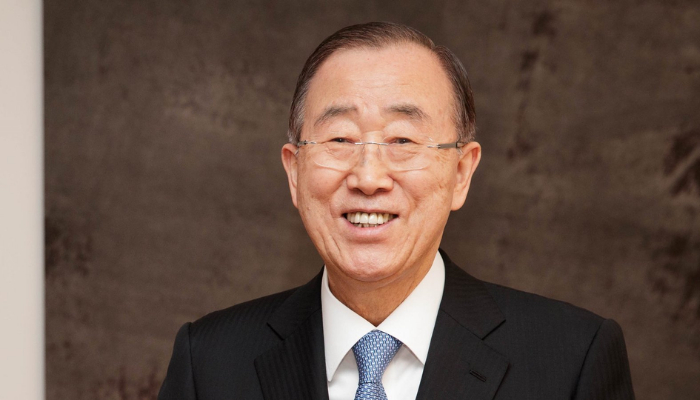- Original Article
- https://businessday.ng/news/article/ban-ki-moon-says-rich-countries-prioritise-arming-ukraine-over-climate-obligations/
Business Day
From Daegu, South Korea
24th of May, 2022

(Photo: Business Day)
Ban Ki-moon, a former Secretary-General of the United Nations has accused Western countries of prioritising military assistance to Ukraine over their obligations to finance efforts to reverse climate change, largely caused by them.
In a keynote address at the 28th edition of the World Gas Conference in Daegu, Republic of Korea, Ban Ki-moon, delivering an address themed “A Sustainable Energy Transition Towards Carbon Neutrality”, said a lack of political will was largely responsible for the non-commitment of western countries.
Developed countries like the United States, the European Union and Japan committed to contributing $100bn every year as a way of encouraging climate adaptation action by developing countries in Copenhagen, Denmark 2009 to contribute.
However, from 2009 to 2020, they contributed only $80bn said Ban Ki-moon, “the promise was to provide $100bn annually, the institutions set up to manage it, the Global Climate Fund (GCF) now located in Korea, last year, they were not able to do anything, and with all these crises happening in Ukraine the developed countries have put more priority on the Ukraine situation.”
Russian President Vladimir Putin on February 24 ordered an invasion of Ukraine in what he called a ‘Special Military Operation” to purportedly rid its neighbour of Nazi sympathizers and prevent a drift towards the West.
Read also: Climate change: Seplat Energy to plant five million trees
Banki Moon said the attack was “unprovoked” and has seriously impacted the energy market sending oil and gas prices to levels last seen over a decade ago triggering energy supply crises in Europe and a looming food crisis across the world.
“The people and country of Ukraine certainly deserve our strong, political and economic, and moral support but that does not mean that all this money earmarked for climate financing should be diverted to this current political issues,” said Ki-moon.
At the United Nations COP 26 discussions held in Glasgow last year, member countries dithered on committing to fully funding adaptation activities in vulnerable parts of the world.
“I don’t think it is a question of lack of finance, rich countries have the money, they have the financial capacity, but it’s a matter of political will,” said the former UN boss.
The goal of adaptation finance is to reduce vulnerability to the harmful effects of climate change caused by highly industrialised nations. Governments, multilateral agencies, and private donors contribute to the funds aimed at financing adaptation around the world.
Africa and other developing countries especially in coastal areas are particularly vulnerable to the impact of climate change even though their activities contribute little to climate change.
The world’s poorest and most vulnerable communities are already struggling to cope with the impact of human activities on the environment as rising seas result in flooding and fertile lands morph into arid deserts.
An Organisation for Economic Co-operation and Development OECD report released last year stated that over $20bn, about 25 percent of total climate finance goes to adaptation.
“This is a fraction of the expected $300bn needed by 2030,” said Amina Mohammed, deputy secretary-general of the United Nations. “This is why the Secretary-General continues to call on all donors to allocate at least 50 percent of their climate finance on adaptation,” she said at COP 26.
Now the modest contribution looks to cease entirely as the focus shifts on arming Ukraine to fend off Russian aggression.
Six months after COP 26, the financing has all but paused. Ki-moon who is now a co-chair of the Global Center on Adaption, an institution that works on adaption financing said nothing was contributed at all last year as the crises in Ukraine now serve as a pretext for rich nations to mask their lack of political will.
Ban Ki-moon, urged world leaders to take action now as time is running out, citing the recent Intergovernmental Panel on Climate Change (IPCC) report which says it’s “now or never” if the world is to stave off climate disaster.
The chance of temporarily exceeding 1.5°C has risen steadily since 2015 when it was close to zero. For the years between 2017 and 2021, there was a 10 percent chance of exceedance. That probability has increased to nearly 50 percent for the 2022-2026 period.

